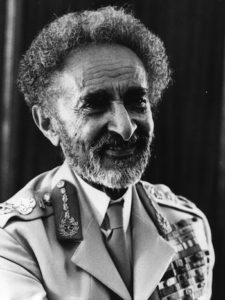
Halie Selassie
Halie Selassie was born on this date in 1892. He was an African dictator and politician.
Selassie was born Tafari Makonnen in Harer, Ethiopia. He married Wayzaro Menen, daughter of Emperor Menelik II, in 1911. By becoming prince (Ras), Selassie became the focus of the Christian majority's approval over Menelik's grandson, Lij Yasu, because of his progressive nature and more reliable political ideas. He was named regent and heir to the throne in 1917 and traveled to such cities as Rome, Paris, and London to become the first Ethiopian ruler ever to go abroad.
In November of 1930, Zaubitu died, and Selassie was crowned emperor, the 111th emperor in the succession of King Solomon. Upon this occasion, he got rid of Tafari Makonnen and took Haile Selassie, meaning "Might of the Trinity."
Selassie worked for economic and social reforms, such as making slavery punishable by law. He gave Ethiopia its first written constitution in 1931. When Ethiopia was attacked by Fascist Italy in 1935, he lived in exile in England until 1941. During World War II, British forces assisted in the liberation of Ethiopia and restored him to the throne.
He was a more equitable ruler than many of those around him. For example, as a young provincial governor, he took only 50% of his peasant’s crops while other governors took 90%, and in the 1950s, as few as 100 political prisoners were tortured in his jails at one time. However, under his long rule, Ethiopia remained in the dark ages. Under Selassie, Ethiopia received more US aid than any other African country, and Washington purchased a $2 million yacht for the Emperor.
Rebels seized the government on December 13, 1960, while he was in South America, but he regained his throne four days later. When Selassie faced an uprising in Eritrea, the US sent advisers and arms to help him smash the revolt. In return for American support, Selassie provided the United States with a naval oasis in the Red Sea and a place for a strategic communications station.
The emperor's estate and palace were nationalized, and in August, Selassie was accused of covering up famine in the early 1970s that killed hundreds of thousands of people. On September 12, he was formally deposed and arrested, and power was given to the Derg, formally renamed the Provisional Military Administrative Council. Selassie's kindness to his animals was his downfall; he was overthrown when photos of him feeding his dogs during the 1973 famine were circulated among his outraged troops.
This group effectively removed Selassie's means of governing, as they had complete military control. In July 1974, an opposing government (Derg) demanded a new constitution when it was found unsatisfactory to their "Ethiopia First" ideology. They proceeded to undermine the emperor's authority and enjoyed much public support. Haile Selassie, the last emperor in the 3,000-year-old Ethiopian monarchy, who ruled for half a century before he was deposed by a military coup last September, died on August 28, 1975, in a small apartment in his former palace. He was 83 years old.
The World Book Encyclopedia.
Copyright 1996, World Book, Inc.
ISBN 0-7166-0096-X
